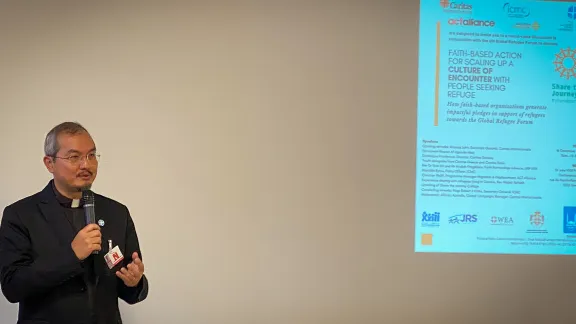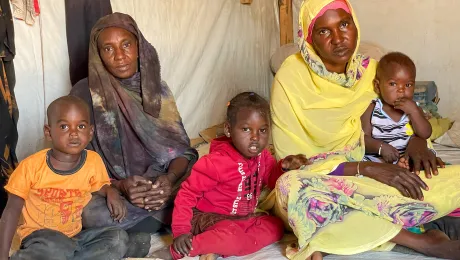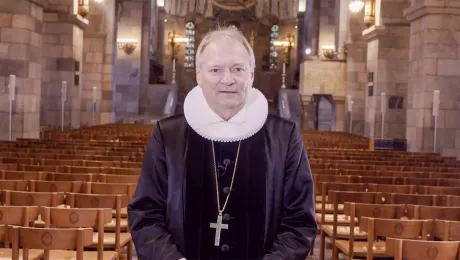
Rev. Dr Sivin Kit, LWF Program Executive for Public Theology and Interreligious Relations speaking at a Global Refugee Forum side event on scaling up a culture of encounter with people seeking refuge, held in Geneva. Photo:: LWF/A. Danielsson
LWF pledges at Global Refugee Forum
(LWI) - Together with many partners, The Lutheran World Federation (LWF) is bringing the voice of faith-based organizations to the Global Refugee Forum, organized by the United Nations High Commissioner for Refugees (UNHCR) from 16-18 December in Geneva, Switzerland.
“It is important that we are not just stating that we are committed to the cause, but that we also show what this looks like in concrete terms,” says Rev. Dr Sivin Kit, LWF Program Executive for Public Theology and Interreligious Relations. “Faith-based organizations and faith leaders are in a unique position to nurture inclusive societies against xenophobia.”
Faith-based organizations and faith leaders are in a unique position to nurture inclusive societies against xenophobia.
Key role of faith actors
The Global Refugee Forum comes one year after the affirmation of the Global Compact on Refugees. Organized by UNHCR, the Forum aims to translate into action the principle of international solidarity and responsibility-sharing by UN member states to pledge concrete examples of support.
Faith-based organizations (FBOs) and religious leaders play a key role in welcoming refugees and migrants, supporting them in rebuilding their lives by creating spaces and opportunities of encounter between host communities and refugees, but also as humanitarian actors in the field.

Participants in the Global Refugee Forum side event on scaling up a culture of encounter with people seeking refuge, held in Geneva.
LWF is one of the largest faith-based implementing partners of the UNHCR, working in humanitarian crises in 25 countries worldwide. In 2013, the UN refugee agency together with FBOs including the LWF published the document “Welcoming the Stranger. Affirmations for Faith Leaders” as a result of a dialogue on faith and protection. In 2018, LWF and Islamic Relief Worldwide (IRW) jointly published a manual on Faith-Sensitive Psychosocial Support, based on experiences from joint work since 2014.
Three pledges from faith-based perspectives
Having experience in working with refugees and migrants on many levels, LWF is bringing three pledges to the forum.
The first is to continue working with the Local to Global approach, which links action on household and community level with civil society and international advocacy mechanisms such as the Universal Periodic Review (UPR) or the Committee on the Elimination of Discrimination against Women (CEDAW). “It’s important that the people of concern can speak for themselves and hold duty-bearers accountable”, says Fabian Wilches, LWF Senior Advocacy Officer.

Rev. Dr Sivin Kit, LWF Program Executive for Public Theology and Interreligious Relations and Mr Atallah Fitzgibbon from Islamic Relief Worldwide, during the 16 December Global Refugee Forum side event in Geneva.
Together with IRW, LWF pledges to further explore ways in which faith-based organizations can foster welcoming and integrating refugees into local societies in a conference in 2020. “The conference will support and show solidarity with the work done by faith actors, harnessing their collective voice to advocate strongly for an end to hatred, xenophobia and intolerance, providing an inspirational rallying call to communities welcoming the stranger all over the world,” Kit explains.
“Jesus was a refugee”
The pledge refers to the Welcoming the Stranger document, expanding and translating it into concrete possibilities. “There are significant scriptural texts that have something to say about refugees or hospitality to foreigners” Kit elaborates. “Coming from the Christian tradition, especially at this time of the year we only need to remember that Jesus himself was a refugee.”
LWF is also part of the coalition Faith Action for Children on the Move, which issued a pledge to, among others, enhance the capacity of local faith actors to apply child protection and safeguarding standards including the creation of safe spaces and specific supports for at-risk groups such as young and adolescent girls and children with disabilities. Faith-based actors are well-placed to capitalize on their expansive community-based networks to champion child rights. The coalition further pledges to offer capacity development support in faith-sensitive humanitarian and psychosocial approaches to aid agencies and faith communities.
Support safe journeys
The coalition also pledges to contribute by providing support for resettlement and complementary pathways with a specific focus on at-risk groups including unaccompanied minors.
LWF member churches are already engaged in the “Humanitarian Corridors” initiative, or have agreed to sponsor refugees eligible for resettlement.


